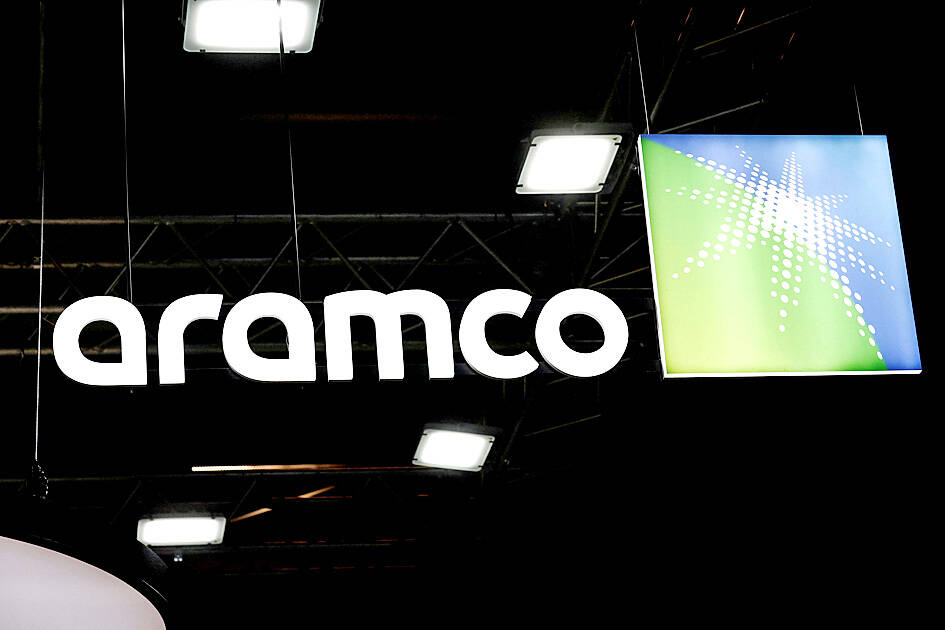Saudi Arabia yesterday launched a secondary share sale in oil giant Saudi Arabian Oil Co (Saudi Aramco), a landmark deal that could raise up to US$13.1 billion in a major test of international appetite for the kingdom’s assets.
The banks on the deal are to take institutional orders through Thursday and price the shares the following day, with trading expected to start on Sunday on Riyadh’s Saudi Exchange.
The offering would be a gauge of Riyadh’s appeal to foreign investors, a key plank of the kingdom’s ambitious plan to overhaul its economy. Foreign direct investment has repeatedly missed its targets.

Photo: Reuters
Analysts and sources have said that the sale would also bolster efforts by the government to wean itself off its “oil addiction,” as Saudi Arabian Crown Prince Mohammad bin Salman once called it.
The sovereign wealth fund, or Public Investment Fund, the preferred vehicle driving the mammoth agenda that has poured tens of billions of US dollars into everything from sports to futuristic desert cities, is likely to be a beneficiary of the funds, they said.
Saudi Arabia is offering investors about 1.545 billion Aramco shares, at 26.7 to 29 riyals, or just under US$12 billion at the top end of the range. The banks can increase the offering by US$1 billion.
If all the shares are sold, the Saudi Arabian government would cut its stake in the world’s top oil exporter by 0.7 percent.
The world’s top investment banks are helping to manage the sale — Citigroup Inc, Goldman Sachs Group Inc, HSBC Holdings PLC, JPMorgan Chase & Co, Bank of America Corp and Morgan Stanley — along with local firms Saudi National Bank, Al Rajhi Capital Co, Riyad Capital Co and Banque Saudi Fransi.
M. Klein & Co and Moelis & Co are the independent financial advisers for the deal.
UBS Group AG’s Credit Suisse Saudi Arabia unit alongside BNP Paribas SA, Bank of China International Holdings Ltd (中銀國際) and China International Capital Corp (中國國際金融) are also helping to seek buyers for the shares, a stock exchange filing said.
About 10 percent of the new offering would be reserved for retail investors, subject to demand.
The deal kicks off as the OPEC+ was yesterday set to meet to determine output policy, with some ministers meeting in Riyadh, sources said.
OPEC+ is cutting output by a total of 5.86 million barrels per day, equal to about 5.7 percent of global demand.
Saudi Arabia produces about 9 million barrels per day of crude, roughly 75 percent of its maximum capacity.
The Saudi Arabian government directly holds just more than 82 percent of Aramco and the Public Investment Fund owns 16 percent, with the remainder held by public investors.

Semiconductor shares in China surged yesterday after Reuters reported the US had ordered chipmaking giant Taiwan Semiconductor Manufacturing Co (TSMC, 台積電) to halt shipments of advanced chips to Chinese customers, which investors believe could accelerate Beijing’s self-reliance efforts. TSMC yesterday started to suspend shipments of certain sophisticated chips to some Chinese clients after receiving a letter from the US Department of Commerce imposing export restrictions on those products, Reuters reported on Sunday, citing an unnamed source. The US imposed export restrictions on TSMC’s 7-nanometer or more advanced designs, Reuters reported. Investors figured that would encourage authorities to support China’s industry and bought shares

TECH WAR CONTINUES: The suspension of TSMC AI chips and GPUs would be a heavy blow to China’s chip designers and would affect its competitive edge Taiwan Semiconductor Manufacturing Co (TSMC, 台積電), the world’s biggest contract chipmaker, is reportedly to halt supply of artificial intelligence (AI) chips and graphics processing units (GPUs) made on 7-nanometer or more advanced process technologies from next week in order to comply with US Department of Commerce rules. TSMC has sent e-mails to its Chinese AI customers, informing them about the suspension starting on Monday, Chinese online news outlet Ijiwei.com (愛集微) reported yesterday. The US Department of Commerce has not formally unveiled further semiconductor measures against China yet. “TSMC does not comment on market rumors. TSMC is a law-abiding company and we are

FLEXIBLE: Taiwan can develop its own ground station equipment, and has highly competitive manufacturers and suppliers with diversified production, the MOEA said The Ministry of Economic Affairs (MOEA) yesterday disputed reports that suppliers to US-based Space Exploration Technologies Corp (SpaceX) had been asked to move production out of Taiwan. Reuters had reported on Tuesday last week that Elon Musk-owned SpaceX had asked their manufacturers to produce outside of Taiwan given geopolitical risks and that at least one Taiwanese supplier had been pushed to relocate production to Vietnam. SpaceX’s requests place a renewed focus on the contentious relationship Musk has had with Taiwan, especially after he said last year that Taiwan is an “integral part” of China, sparking sharp criticism from Taiwanese authorities. The ministry said

US President Joe Biden’s administration is racing to complete CHIPS and Science Act agreements with companies such as Intel Corp and Samsung Electronics Co, aiming to shore up one of its signature initiatives before US president-elect Donald Trump enters the White House. The US Department of Commerce has allocated more than 90 percent of the US$39 billion in grants under the act, a landmark law enacted in 2022 designed to rebuild the domestic chip industry. However, the agency has only announced one binding agreement so far. The next two months would prove critical for more than 20 companies still in the process